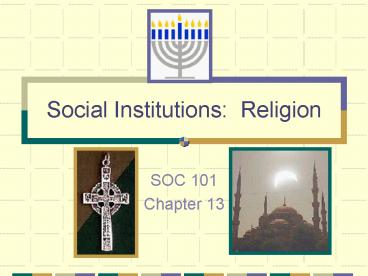Social Institutions: Religion - PowerPoint PPT Presentation
1 / 19
Title:
Social Institutions: Religion
Description:
A social institution involving beliefs and practices based on a conception ... frame of reference' gives us 'the semblance of ultimate security and permanence' ... – PowerPoint PPT presentation
Number of Views:960
Avg rating:3.0/5.0
Title: Social Institutions: Religion
1
Social Institutions Religion
- SOC 101
- Chapter 13
2
What Is Religion?
- A social institution involving beliefs and
practices based on a conception of the sacred - Religion is a matter of faith, belief anchored in
conviction rather than scientific evidence - Exists in some form in all societies
3
Three Key Elements in Religion
- BELIEFS that some things are sacred (forbidden,
set off from profane) - PRACTICE (rituals) based on the things
considered sacred - A MORAL COMMUNITY (a church) resulting from a
groups beliefs and practices
4
Theoretical Analysis of Religion
- Sociologists have applied various paradigms to
the study of religion - Structural-Functional Analysis has identified
functions of religion - 1. Social cohesion
- 2. Social control
- 3. Providing meaning and purpose
5
Dysfunctions of Religion
- 1. May encourage war and conflict
- 2. May serve as justification for persecution
- 3. May retard needed change
6
Symbolic Interaction Analysis
- Peter Berger argues that people socially
construct religious beliefs as a response to
lifes uncertainties - Placing our brief lives within some cosmic frame
of reference gives us the semblance of ultimate
security and permanence
7
Social-Conflict Analysis
- Marx viewed it as opium of the people
- Conflict theorists argue that religion tends to
legitimize inequality and the status quo
8
Types of Religious Organizations
- Churches, which are religious organizations well
integrated into their societies, fall into two
categories - 1. State church a church formally allied with
the state (Example Iran) - 2. Denomination a church, independent of the
state, that recognizes religious pluralism
(Example Methodist)
9
Sect
- A type of religious organization that stands
apart from the larger society - Sects are often marked by charismatic leadership
and suspicion of the larger society - Examples Amish, Jehovahs Witnesses
10
Cult
- A new religious movement with few followers
largely outside a societys cultural traditions - Usually led by a charismatic leader
- Christianity began as a cult
Rev. Jim Jones
11
Loflands Theory
- He stresses 7 accumulating conditions for
conversion - 1. Experience enduring tensions
- 2. Within a religious perspective
- 3. Self-definition as a religious seeker
- 4. Encounter cult at a turning point
- 5. Wherein an affective bond is formed
- 6. Non-cult attachments low
- 7. Exposure to intensive interaction.
12
Religion in the United States
- Great diversity - 350,000 congregations and
hundreds of denominations - No dominant religion
- Largest - Roman Catholic, 61,200,000
13
Religious Commitment
- Surveys report about 90 of American adults claim
some religious preference - More than half say they are Protestants,
one-quarter Catholics, and 2 Jews
14
Religiosity
- The importance of religion in a persons life
- A recent survey (1999) found that 88 believe in
a divine power 50 report they pray each day
31 report attending weekly religious services
15
Secularization
- Refers to the historical decline in the
importance of the supernatural and the sacred - While some measures of U.S. religiosity
(including membership in mainstream churches)
have declined, others (such as membership in
sects) are on the rise. - Religion is unlikely to disappear
16
Religious Revival
- One striking trend growth of fundamentalism, a
conservative religious doctrine that opposes
intellectualism and worldly accommodation in
favor of restoring traditional, otherworldly
religion
17
Religious Fundamentalism
- Distinctive in 5 ways
- 1. Interprets sacred texts literally
- 2. Rejects religious pluralism
- 3. Pursues the personal experience of Gods
presence
- 4. Opposes secular humanism
- 5. Endorses conservative political goals
18
Electronic Church
- Has blossomed into its own type of church
- Its preachers are called televangelists
- Most recent form is on the Internet
19
Religion in the 21st Century
- It will remain a major part of modern society
- Immigration will intensify and diversify the
religious character of U.S. society
20
Closing Quiz
- True - False Items
- 1. According to Durkheim, all religions
separate the sacred from the profane. - 2. Cults often begin with the appearance of a
charismatic leader. - If you were planning to start a cult, where would
you look for recruits?































